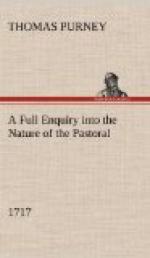That there may be several sorts of Pastorals.
To conclude this Essay, as there are Tempers and Genius’s of all sorts, so perhaps it may not be amiss to allow Writings of all sorts too. I think every Person’s Aim should be to be subserving as much as possible, to the Delight and Amusement of his Fellow-Creatures. And if any can take pleasure in what is really not pleasant, ’tis pity, methinks, to rob ’em of it. Yet if there is in nature a Method which pursued will be still more delightful, the Critick is to be observed who points out the Way thereto.
If any of my Countrymen therefore can take delight from reading the Pastorals of Theocritus and Virgil, or any of those who have imitated those two Ancients, I shall be ready to allow that there may be several sorts of Pastorals. ’Tis certain that Milton and Homer, (thro’ the Scene of the Former lying about the Sphere of Men) are as different as East from West, yet both excellent. Tragedy has as different sorts as Epick-Poetry; Nor are Julius Caesar and the Orphan of the same Nature. The same difference in Tragedy, is between all those, whose Chief CHARACTER is a Hero, and those that draw a Female, as Jane Shore, the Lady Jane Gray, and the like, are to me entirely different from Shakespear’s, not respecting the Excellency of ’em. Shakespear having a Genius made for the Sublime, and perhaps Mr. Row rather for the Soft and Tender; as appears in two Passages at the End of JANE SHORE. Which in my Judgment are not much excell’d by even Otway himself.
Since I have mention’d that Author, I can’t help remarking how difficult a thing it is for any Person to know what his own Genius is fittest for; and how great a Chance it is whether ever a Writer comes to know it. Tho’ Otway had so fine a Genius for the TENDER, it never appear’d till a little before he dyed. Thro’ all his Plays we cannot trace even the least Glimpse of it, till his two last, The Orphan and Venice Preserv’d. But we run the Digression too far.
SECT. 2.
What Kind of Pastorals would please most Universally; and delight the greatest Number of Readers.
For my own Part, as I said, I could be delighted with any Kind of Pastoral, if the Writer would but be at the Pains of selecting the most beautiful Images, and tenderest Thoughts. This is the first and principal Matter. Yet this might be perform’d by a moderate Capacity, without a Genius born for Tragedy.
Would a Person but form a delightful Story, invent new and uncommon and pleasing Characters, and furnish his Mind with a small Number of fine Images from the Country, before he sate down to write his Pieces, He would not fail of Success. But if Writers will only put down a parcel of common triffling Thoughts from Theocritus and Virgil, nor will so much as aim at any thing themselves, can you blame me Cubbin, if I throw ’em aside. Let ’em have a thousand Faults, I can be pleas’d by ’em, if they have but Beauties with ’em; nor will you ever hear me blame Shakespear for his Irregularity. And Pastoral is delightful to me in it’s own Nature, that were these Authors to employ but my Mind in any manner, I should have Patience to peruse ’em.




